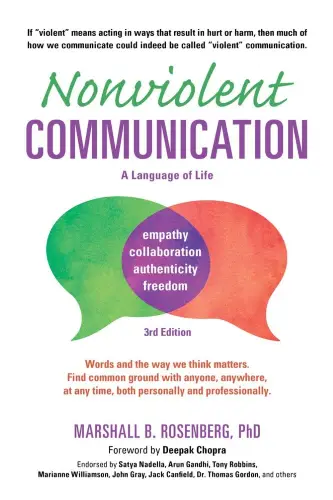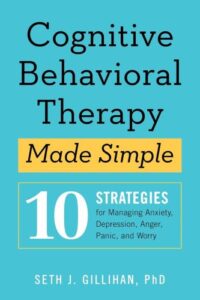Nonviolent Communication: A Language of Life
Book Author: Marshall Rosenberg
Summary reviewed by:
Terrence Timmons
Terrence Timmons
Analyst
Bachelor of Arts (BA), University Of California, Santa Barbara 2019
With over 4 years of experience as an analyst. Terrence Timmons is committed to analyzing summaries without compromising on quality.
Nonviolent Communication: A Language of Life: Summary
Unlock the Power of Compassion: How "Nonviolent Communication" Transforms Lives
At the heart of "Nonviolent Communication: A Language of Life" lies a compelling premise: understanding and practicing nonviolent communication (NVC) can radically enhance how we connect with others and ourselves. Marshall Rosenberg, a seasoned psychologist with extensive experience in conflict mediation and educational initiatives, introduces a method that transcends mere conversation to become a transformative psychological tool. Underpinned by principles from psychology and sociology, NVC emphasizes empathy and the deep human capacity for compassion.
Rosenberg's expertise as a clinical psychologist and mediator grounds the book in real-world experiences, lending credibility to its methodology. He presents NVC not just as a technique but as a holistic approach to cultivating empathy, honesty, and self-awareness. This approach is not only theoretical but is also practical, with the potential for significant personal and communal growth.
The crux of NVC lies in four key components: observing without judging, identifying and expressing feelings, acknowledging needs, and requesting actions to meet those needs. For example, instead of saying, "You never listen to me," an NVC approach would be, "I feel neglected when I don't see active engagement in our conversations. Could we discuss ways to improve our communication?" This pivot from blame to mutual understanding invites more open and constructive dialogue.
Rosenberg guides readers through applying these principles in various scenarios, from intimate relationships to professional environments and even in global peacebuilding efforts. The book is replete with exercises, dialogues, and real-life examples that allow readers to practice NVC in their daily interactions, thereby fostering more meaningful and compassionate connections.
Through "Nonviolent Communication," Rosenberg offers not just a manual for better conversations but a roadmap to a more empathetic and connected life. The strategies delineated are not abstract theories but actionable steps that encourage self-reflection, clarity in communication, and, ultimately, the nurturing of relationships based on mutual respect and understanding.
Nonviolent Communication: A Language of Life: Genres
Non-fiction
Self-help
Communication
Personal Development
Behavioral Science
Communication Social Skills
Communication Studies
Personal Growth
Relationships
Emotional Intelligence
Psychology
Relationships Sex Education
Leadership Management
Business Communication
Social Psychology
Interpersonal Relations
Conflict Resolution
Personal and Professional Development
Nonviolent Communication: A Language of Life: Themes
Empathetic Listening: Truly understanding another person’s feelings and needs without judgment. When a mother hears her son’s frustration about school and realizes he needs support, not criticism.
Empathy: Central to NVC is the practice of empathy, both for oneself and others. Rosenberg illustrates how empathy transforms communication by allowing individuals to genuinely understand and connect with each other’s feelings and needs, moving beyond surface-level exchanges.
Authentic Expression: The book emphasizes the importance of expressing one’s own feelings and needs honestly and clearly. Through various dialogues, Rosenberg demonstrates how authentic expression fosters trust and deeper connections.
Conflict Resolution: NVC is presented as a powerful tool for resolving conflicts by focusing on underlying needs rather than surface-level arguments. Rosenberg provides scenarios where conflicting parties reach mutual understanding and solutions by addressing each other’s needs.
Personal Growth: A recurring theme is the use of NVC for personal development. The book shows how self-awareness and clarity in expressing one’s own needs lead to personal growth and improved relationships.
Honest Expression: Conveying one’s own feelings and needs in a way that’s clear and non-judgmental. A manager sharing her concern about a project’s deadline, expressing her need for timely updates without blaming her team.
Observation vs. Evaluation: Distinguishing between objective observations and personal evaluations or judgments. Seeing a colleague come late and simply noting the fact, rather than labeling them as “irresponsible.”
Taking Responsibility for Our Feelings: Recognizing that our feelings are a result of our needs and not others’ actions. Feeling hurt because a need for appreciation wasn’t met, not because “someone made me feel this way.”
Making Clear Requests: Asking for what we want in clear, positive, actionable terms. Instead of saying “Don’t be so noisy,” asking “Can you please lower your voice?”
The Power of Needs: Understanding that all human actions are attempts to meet universal needs. Recognizing that a child’s tantrum might be an expression of their need for attention or understanding.
Transforming Conflict: Using NVC to mediate disagreements and find solutions that meet everyone’s needs. Two friends disagreeing on a movie choice, but through NVC, realizing one needs relaxation while the other seeks excitement, leading to a compromise.
Nonviolent Communication: A Language of Life: Methodology
In synthesizing the essence of "Nonviolent Communication," we prioritized user-focused content by aligning with your interests in personal growth and effective interaction, reflecting themes of empathy and authentic expression. Our expert analysis delved deeply into the book's psychological and communicative frameworks, mirroring its conflict resolution strategies. We ensured the summary's practical application, equipping you with actionable insights for enhancing daily communications, akin to the book's approach to applying NVC in real-life scenarios. Through this meticulous process, we uphold quality and integrity, ensuring our summary is a faithful and accessible rendition of Rosenberg's transformative work.


Nonviolent Communication: A Language of Life
Date Published: 1999
Disclaimer: As an Amazon Associate I earn from qualifying purchases.




